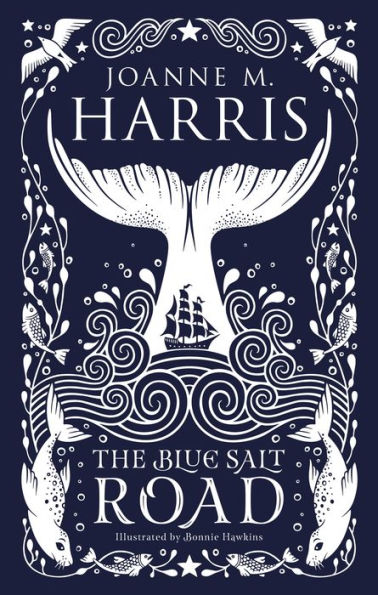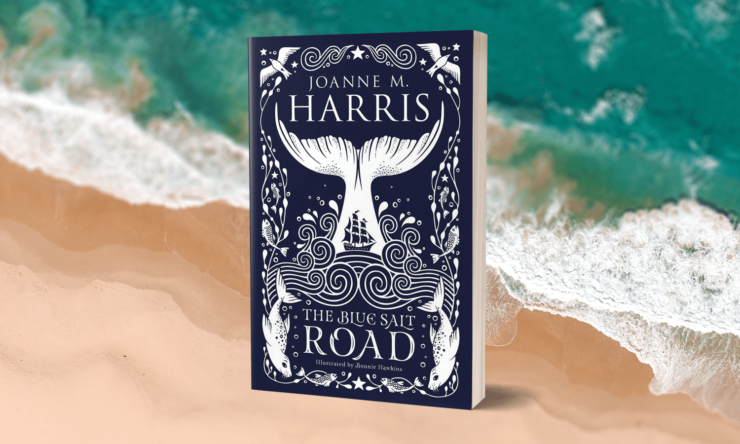Selkie stories are usually about an entrapped wife—the grey seal who can take off her skin and shift into human form, caught by a human male and kept subservient and loyal by force because her skin, her true nature, is locked away. She forgets who she is, and a spends a lifetime as wife and mother and caregiver to humans, generally living a life of mundane domesticity that is nothing like her previous wild, adventurous joyous sea life, and is always wondering why she feels like she’s missing a vital part of her, why the sea calls out to her, but unless she finds her sealskin, she is never able to go back to who she was, or where she belongs.
But in The Blue Salt Road, Joanne Harris’ latest retelling of Scottish folk tales (with illustrations by Bonnie Hawkins), it is a young woman who is the captor, an island girl who wants more than the boys she has grown up around, and so decides only a selkie prince will do for her.
Beautiful, determined Flora is a girl who knows what she wants: “I will catch myself a prince, and bear a pretty princeling, and all the girls of the island shall envy my good fortune”, she tells her mother, who simply reminds her that after 25 she will be considered past her prime, and no longer of marriageable age. Her father, a whaling ships gunnerman, wants to spend most of his time at sea, and isn’t much for opinions but loves his child dearly. The island is small, with everyone’s roles socially predetermined and set—the women stay home and nest; the men go to sea and fend for their families. Flora wants more than the average girl her age, but even so does not really step outside her societal binds. She is true to her word, and throwing all caution (and clothing) to the wind one night, she approaches a selkie prince who has been wandering the island in his human form out of sheer curiosity, ignoring the warnings of his people.
Very soon Flora and the selkie’s relationship becomes more than just physical, with both professing love for each other, but the selkie does not understand the concept of marriage or monogamy, not even when Flora finds herself pregnant and insists the selkie stay on land to take care of his new family. She’s determined to keep him at her side, and using what she’s learnt from her grandmother’s stories of the selkie, she steals away his seal skin one night, hiding it in a cedar chest locked with a silver key. The selkie immediately loses all memory, and is completely vulnerable to Flora’s manipulations and suggestions as to who he may be or what he should do. She takes him home and introduces him to her parents as the man she plans to marry, the father of her unborn child. In the book’s first truly horrific moment, she also lovingly feeds him the flesh of seals, knowing what he truly is.
What follows for the selkie is sad, and frightening. Flora’s father repeatedly brings up the importance of family loyalty, and of providing for those for whom you are traditionally meant to take care of. He takes great pride in fulfilling his role, and encourages his new son in law to immerse himself in his new life as fast as possible, even if that means fighting his instincts when it comes to hunting whales and seals. The selkie, of course, does not know just why is he so horrified, and tries as much as he can to be the man his new family expect him to be. But the brutal killing of animals is especially horrific as the selkie has to watch (and then participate in) the gruesome, violent murder of his own kind, as well as the other peaceful sea creatures he once lived among.
Buy the Book


The Blue Salt Road
The Folk’s survival is based entirely on the death of the selkie’s people’s. The humans on the island make their living off hunting sea creatures; their lamps are lit with the oil of whales or seals, their meals are the flesh of seals, even their ceremonial clothes are made from sealskin. To have entrapped him, the way Flora has, with no memory of who is he or who is people are, is bad enough, but then to knowingly push him to assimilate into a society that survives and glorifies the killing of his people makes Flora appear incredibly cruel, especially when we see that once the selkie has lost his ‘wildness’ and individuality along with his memory—once he has been ‘tamed’—Flora loses interest in him both romantically and sexually. Once she is pregnant all her focus turns to her unborn child. She has caught herself a prince like she said she would, but now that she has one entirely under her thumb (or under the bind of a stolen skin), she doesn’t know quite what to do with him. What follows is a sad story about determined desire—to posses an other, to be better than most, to force control – and its consequences.
The Blue Salt Road can be a frightening book. It’s also thought provoking and evocative, with Bonnie Hawkins’ rich illustrations adding to the stormy sea moodiness of the language and imagery of the text. It is also a sad little story, one with no moral judgment, though Harris makes certain that her characters understand that they must all live with the consequences of their actions, no matter what they may be. She offers some redemption for them, some softening of their cruelty once they understand that they have been wrong, but she does not offer them any sudden salvation—cruelty, human or otherwise, comes at its own cost, and karma will have its way.
The Blue Salt Road is available from Gollancz.
Mahvesh loves dystopian fiction & appropriately lives in Karachi, Pakistan. She writes about stories & interviews writers the Tor.com podcast Midnight in Karachi when not wasting much too much time on Twitter.










